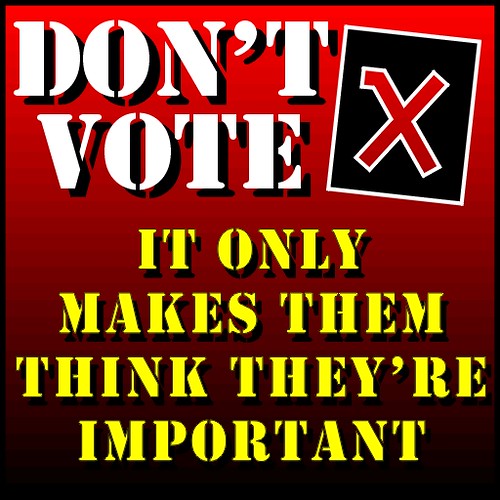The three countries I have spent an extended time in during my adult life, the US, Ireland, and Germany, have just held, or are about to hold elections. This has caused me to reflect on the political journey I have gone on in a relatively short period of time. The person I was when I first became interested in politics would probably despise the person writing this. The political events and crises that have shaped my current views and caused the thought of voting for any of the candidates or parties on offer to seem a variation of unthinkable, unimportant or uninspiring to me now.
While there can be many motivations for voting, the one I was most exposed to and the idea I will be reacting to here is that it was a civic duty; one should vote to be able to engage properly in politics.
The first indignation I remember hearing at someone not being bothered to vote was a schoolteacher in Ireland raising her voice to highlight that men had died for our right to vote. However brutally delivered, this basic point makes sense in an idealised world. We live in a society, and voting for who represents your preferences in the state’s decision-making house is important, part of the social contract even. A social contract you had no decision in being a part of, but a contract nevertheless. What the other side has to do to break the contract is never explained. To have a meaningful political opinion, you must vote. No matter what you say about anything else. And if you don’t agree with the nature of this decision-making process?
In many ways, I represent the ideal politically-informed citizen. I talked about and was interested in politics from a young age. I followed them as if they were a football team. I read mainstream newspapers. I thought what the government was doing was interesting. I studied political science. I voted when I turned 18. People who did not follow politics asked me (and still do) who I thought would win an election.
After a while, I outgrew this. Some of this came naturally as I got tired the repetitiveness. But also, I realised I had lived through the world’s largest financial recession in 2008, the rise of the far-right, the Covid pandemic, the initiation of a major interstate war in Ukraine, and now the livestreaming of a genocide in Gaza. To see how consistently boring and predictable the politicians who I was supposed to admire were sparked a reaction in me.
After the 2008 financial crash, the Irish government subserviently implemented an EU austerity package that thinned out the state’s public services and sold other assets to the nearest bidder. The effects are seen today in the crippling housing crisis, resigning Ireland’s youth to an extended sentence in their childhood bedroom, while faceless international capital scoops up vacant properties for their portfolio. The obvious mistakes and oft-ignored greed of a few European bankers is rarely questioned, and quickly forgotten. The cause lies, of course, in oppressive power structures, an undemocratic EU, and the undermining forces of globalisation and financialization.
The rise of the far right in the USA and the UK should have been a wake-up call for those countries where their popularity was still fringe. Any attempt at locating the rise of fascism in economic conditions seems to have been left to fringe economists or historians, and instead the focus on personalities is the tactic of choice across the US, Ireland, and Germany. The limited worldview of all involved seems to have prevented any efforts at improving education, redistributing wealth, or addressing grievances. They have now taken to either name-calling the supporters of these figures or just adopting the fascist policies anyway. But this is democracy by majority rule. Parties don’t have to care about people who don’t vote for them in any serious manner. No wonder the main emotion of far-right voters is insecurity and fear of losing control over their lives. They don’t have much control.
The Covid pandemic was the real inflection point in my personal political liberation. This seemed to me like an obvious opportunity for societal self-reflection and accounting. However, the main focus of most governments was to get everything back up and running as quickly as possible. Back to the office. Back to exams. Back to airports. I was reminded so obviously of the economic inequalities that define our world by how impossible it was to deliver vaccines to the Global South. Token mentions of the need to vaccinate everyone were made at major international gatherings, but it would have taken measures of unprecedented scope for such a goal to be realised. These facts to me were indisputable evidence that things don’t work the way they should, and a protracted discussion on morality wasn’t necessary to determine that.
Then came the Russian invasion of Ukraine in 2022. While this was obviously an aggressive act by an imperial power, the overreaction on the part of the States and the media I had grown sceptical of dumbfounded me. Sensing the opportunity to define an insecure European identity, politicians and media outlets competed for the honour of Most Outraged. The sheer preponderance of comparisons to Hitler and claims the invasion was “unprecedented” or “unprovoked” were themselves strong enough to initiate scepticism even if it was offensive to any understanding of history.
Then came the assault on the people of Gaza. This is obviously more relevant to politics in my later homes of the USA and Germany, which continue to arm and support Israel, demonise Palestinians, and slander anti-Zionist protestors. The Irish state’s inability to act is, however, still an illustration of the power dynamics that ultimately govern international politics. Despite my inherent cynicism at this stage, I am perplexed that the pictures coming from Gaza broadcast over an ever increasing range of platforms have not budged mainstream policy.
How much evidence is needed to withdraw your consent of this system? By voting, you are expressing an inherent support for the social contract that allows people who have acted this way to represent you. Voting within a democracy should be an “expression of the struggle within, expressing the solution to a struggle within oneself”, according to theorist Donald Winnicott.
There is a great solace to be found in people who have had similar experiences to you, where politics is a major part of their person. Accounts abound about how important voting was for immigrants coming from authoritarian countries. The pride they have in their vote and their ability to make change was truly inspirational. I believe everyone should have that feeling when voting or expressing a political opinion, as it is or should be a personal reflection and a reflection of yourself. It should be an act of identity formation, in comparison to more overtly repressive regimes. If you think this personal expression would be better attained through a different way of organising, I do not think you should have to lend any legitimacy from your personal expression. When I look at the electoral options on offer in my past homes, there is nothing that comes close to representing my preferences or accounting properly for the failures the governing process itself has produced.
If you don’t want to vote racist, in Ireland your options are limited. Votes for small, social democratic parties are essentially votes for conservative coalitions, as they will never be able to govern alone. There are also “radical Left” options, but they have been calling for a “left government”. This would involve governing with a party that has made it increasingly clear over the past few years it is a centrist party, while also imploding from a series of scandals. If belief in this centrism hasn’t been shaken by now, I don’t know it ever will be.
In Germany, the mainstream parties have taken to coopting the far-right’s agenda. The nation’s borders have been effectively closed since September when controls were reintroduced, and they say want to ship migrants back to Afghanistan. Die Linke is in an even greater crisis, increasingly pro-EU and pro-NATO, and facing significant infighting.
When it comes to the US, what are you even voting for? Kamala Harris decided the Hillary Clinton strategy of courting Republican voters was her best shot. She had, at various points, promised to appoint a Republican to her cabinet, appoint a board of advisors which will intentionally include Republicans, and was joined by former Republican Liz Cheney at an event where a Muslim-American Democratic politician was refused entry. It is hard to tell if they thought this tactic would actually work this time around, or whether she is actively opposed to listening to some of those kicked out of a democratic propaganda event in Chicago. Trump’s comprehensive victory in every swing state shows just how flawed a strategy this was.
If you don’t feel politics is properly representing your opinions, and you don’t feel a major difference between the options presented to you, you have a right to remove the legitimacy you personally lend to this social contract. Just because a large segment of the same political class that let you down feels this is the way to make change does not mean you have to think that way too. In many ways, they rely on your submission to this method of political action for legitimacy. If only 20% of people voted, that would certainly rob a lot of the legitimacy any administration takes from an election victory.
If you think you are making a difference by voting, statistically speaking you are not. This narrative is an effort of democratic psychology. It should be up to those benefitting from your vote to convince you to lend them legitimacy, and withholding that vote should be considered a reasonable option.
There are many reasons to vote, including to show solidarity with people or candidates you personally believe in. You could also vote because you might think it does no harm and sure, why not? There are other forms of political expression, participation, and strategy that do not rely on voting alone, but see it as one part of a broader political strategy. I am not discounting those here, just countering an argument I have heard most of my life and describing the political journey I have gone on to get here. You should be able to withdraw your personal participation in a system that has failed you so often.




